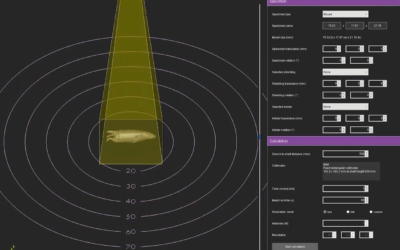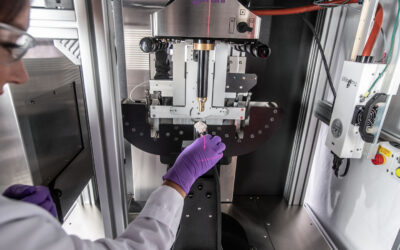Studies show that radiotherapy of a primary tumor in combination with immunoadjuvants (IA) can result in increased survival or immune-mediated regression of metastasis outside the radiation field, a phenomenon known as abscopal effect. However, toxicities due to repeated systematic administration of IA have been shown to be a major obstacle in clinical trials. To minimize the toxicities and prime a more potent immune response, Ngwa et al have proposed that inert radiotherapy biomaterials such as fiducials could be upgraded to multifunctional ones loaded with IA for in situ delivery directly into the tumor sub-volume at no additional inconvenience to patients. In this preliminary study, the potential of such an approach is investigated for lung cancer using anti-CD40 antibody. First the benefit of using the anti-CD40 delivered in situ to enhance radiotherapy was tested in mice with subcutaneous tumors generated with the Lewis Lung cancer cell line LL/2 (LLC-1). The tumors were implanted on both flanks of the mice to simulate metastasis. Tumors on one flank were treated with and without anti-CD40 and the survival benefits compared. An experimentally determined in vivo diffusion coefficient for nanoparticles was then employed to estimate the time for achieving intratumoral distribution of the needed minimal concentrations of anti-CD40 nanoparticles if released from a multifuntional radiotherapy biomaterials. The studies show that the use of anti-CD40 significantly enhanced radiotherapy effect, slowing the growth of the treated and untreated tumors, and increasing survival. Meanwhile our calculations indicate that for a 2–4 cm tumor and 7 mg g−1 IA concentrations, it would take 4.4–17.4 d, respectively, following burst release, for the required concentration of IA nanoparticles to accumulate throughout the tumor during image-guided radiotherapy. The distribution of IA could be customized as a function of loading concentrations or nanoparticle size to fit current Stereotactic Body Radiotherapy schedules. Overall, the preliminary results support ongoing work in developing multifunctional radiotherapy biomaterials for in situ delivery of immunoadjuvants such as anti-CD40 to leverage the abscopal effect, while minimizing systemic toxicities. The potential of extending such an approach to other cancer types is discussed.
Yao Hao1, Sayeda Yasmin-Karim, Michele Moreau1, Neeharika Sinha, Erno Sajo1 and Wilfred Ngwa






